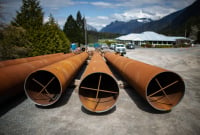Support strong Canadian climate journalism for 2025
Last month, an orphaned orca calf was marooned in a lagoon on the north coast of Vancouver Island. People around the world followed the rescue mission with bated breath.
They let out a collective sigh of relief when the calf finally swam free last week, thanks to the concerted efforts of First Nations stewards.
As I watched the public response to “Little Hunter,” I recalled the collective grief the public felt when Tahlequah, from the Southern resident family, pushed her dead baby calf for 17 days in 2020.
Killer whales are deeply beloved here in B.C. They are part of our identity, a source of pride and reverence. For Indigenous peoples, these whales are our relatives.
The iconic species captivates people around the world. They’ve even become the face of tourism in B.C. — “Come visit the whales,” the ads say.
Yet the ads fail to accurately paint a picture of what’s happening in the region.
The Salish Sea — the place I belong to — was once one of the most biodiverse regions in the world. But in my lifetime, I’ve seen salmon populations plummet and herring disappear. I’ve watched with grief and alarm as the population of ȻOLȽELEMEĆEN — southern resident killer whales — dips slowly downward year after year. There are now only 74 residents left.
A decline in Chinook salmon, contamination and pollution, high vessel traffic and underwater noise have contributed to their decline.
Beginning in a few weeks, my relatives will face a new threat: increased tanker traffic from the Trans Mountain pipeline.
It was a long, contentious road to get here. In 2018, the Government of Canada purchased the pipeline for $4.5 billion. Since then, the price has ballooned to $34 billion, making it the most expensive infrastructure project in Canadian history.
On May 1, the pipes turned on in Alberta, sending the long-feared bitumen from the tar sands to the coast. This bitumen will be loaded onto tankers in the Port of Vancouver and transit the Salish Sea to foreign markets.
The environmental, social and economic consequences of this project are significant — not to mention the climate impacts. Canada is the fourth-biggest oil producer in the world, and tar sands bitumen is one of the dirtiest fossil fuels on the planet.
Every step of the way, the pipeline faced opposition. Multiple court challenges were launched. One court case successfully argued that Canada failed to address impacts of increased tanker traffic on sensitive marine species such as orcas. This challenge resulted in a second environmental assessment and 16 recommendations the federal government committed to implement.
Recommendation 1 was to complete a comprehensive cumulative effects management plan for noise pollution in the Salish Sea.
Examining the cumulative impacts of industry is crucial, because the Salish Sea is already riddled with industrial disturbances that negatively impact orcas and other sensitive marine species.
Tankers already pass by my community, loaded with bitumen from the tar sands. Shipping containers ply through these waters every day. With the expansion of the Roberts Bank shipping Terminal — a project the government greenlit despite acknowledging the impact it would have on salmon and orcas — this number will grow exponentially. Several LNG projects in the region await approval; if permitted, the increased shipping traffic would further strain this sensitive marine environment.
The list of projects that threaten the survival of orcas goes on.
Unfortunately, the federal government failed to assess the cumulative impacts of noise pollution on the Salish Sea, despite its promise to do so.
The worst-case scenario of increased tanker traffic from Trans Mountain is a catastrophic oil spill. Some say it isn’t a question of if there will be an oil spill, but when.
I cannot allow myself to imagine that future.
We need to take a long, hard look at what we value as a society. We need to ask what we want to pass on to future generations. Without decisive action and effective leadership, we risk losing southern resident killer whales forever.
It’s not too late to turn the metaphorical tanker around. I believe governments can put the interest of people and the environment first. One step in the right direction is to permanently shift our decision-making to account for the cumulative impacts of industrial projects.
If the orca calf teaches us anything, it’s a lesson of resilience.
I remember our sacred teaching: QEN,T ŦTEN SĆÁLEĆE – you look after your relatives.
Despite the successive waves of poor government decision-making, my duty to stand up for the Salish Sea never diminishes.
Adam Olsen (SȾHENEP) serves as the Member of the Legislative Assembly for Saanich North and the Islands, representing the B.C. Green Caucus, and is a member of Tsartlip First Nation (W̱JOȽEȽP).






Comments